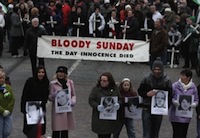
A difference of opinion has emerged among Derry’s Bloody Sunday families over the future of the annual commemorative march.
Thousands of people from all over the world take part in the march each year in memory of the 1972 massacre.
Held on the Sunday closest to the actual January 30 anniversary, it retraces the route of the original anti-internment march.
In June last year, Lord Saville exonerated all of the Bloody Sunday victims from any guilt. He also delivered a damning indictment of the Parachute Regiment soldiers responsible for the killings. As his report was published, British prime minister David Cameron issued an apology on behalf of the British government.
However, none of the killers have been prosecuted and the British Army has continued to refuse to explain its actions that day.
Now some of the Bloody Sunday families have proposed this year’s march should be the final one. John Kelly, whose brother Michael (17) was shot dead, said the majority of relatives felt this way.
“This should be a march of celebration. It should be a victory march celebrating the victory over injustice,” he said.
Mr Kelly said Bloody Sunday would continue to be commemorated in a variety of other ways.
“It’ll be commemorated by the annual Mass and morning service (held annually at the Bloody Sunday monument) and by the Bloody Sunday lecture and other Bloody Sunday weekend events,” he said.
Mr Kelly added that many people presumed there would be no march this year as the aims of the Bloody Sunday families had been achieved. But Liam Wray, whose brother Jim (22) was shot dead, said he would like to see the march continue.
Mr Wray said it appeared that a collective decision was taken by the families to end the annual march this year but this was not the case.
“No-one consulted with me about this,” he said. The Derry man said a number of other family members felt the same as him,
“I have always said that the families don’t own the march and I have always felt greatly privileged so many people march each year,” he said.
“I respect the views of others but if people want to continue organising an annual march they should. It is part of Irish history.”
Mr Wray said the march was known internationally and was a platform for other campaigns and organisations to highlight their causes.
“I think it would be very sad and detrimental to civil rights and human rights if it disappeared,” he said.
![[Irish Republican News]](https://republican-news.org/graphics/title_gifs/rn.gif)
![[Irish Republican News]](https://republican-news.org/graphics/title_gifs/harp.gif)

